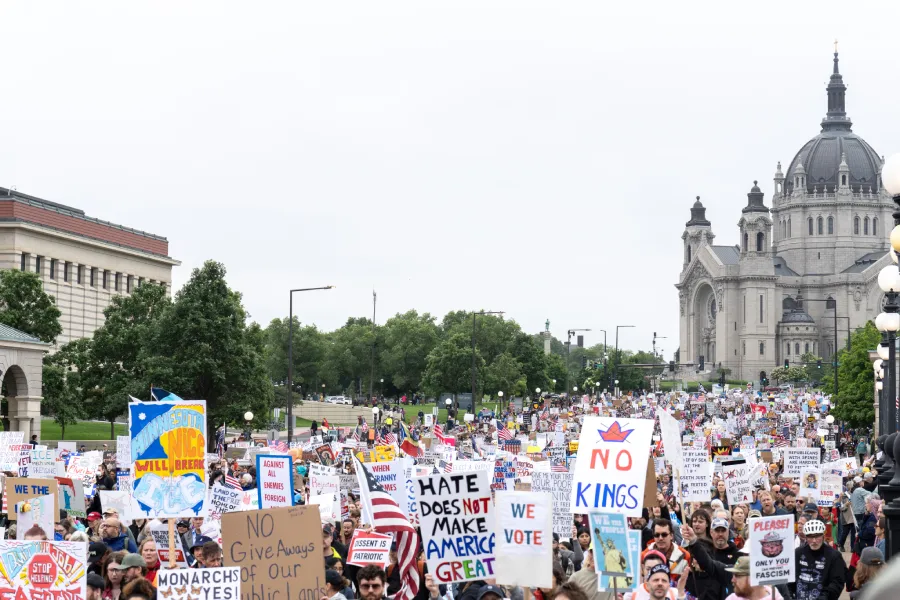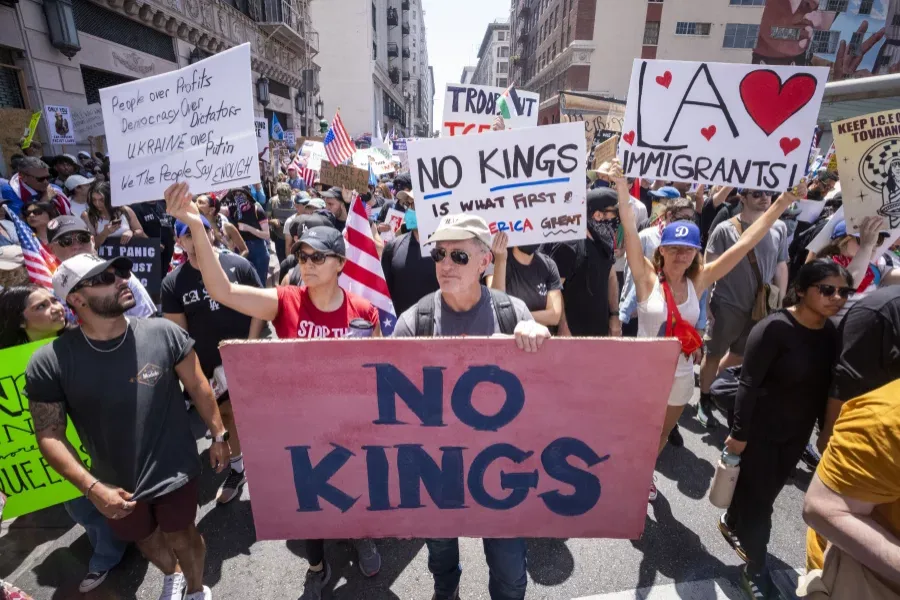As the No Kings Protests surge through the streets of Washington D.C. and beyond, America faces one of its most defining legal and democratic tests in decades. What began as a rallying cry against perceived authoritarian overreach has evolved into a full-scale national movement invoking the very principles of the U.S. Constitution.
This weekend, more than 2,600 coordinated demonstrations are expected to take place across all 50 states, echoing the June protests that drew nearly five million participants. From the steps of the Capitol to Los Angeles, citizens are uniting under one resounding message: “In America, we have no kings.”
Organized by groups such as Public Citizen, ACLU, and National Lawyers Guild, the No Kings Protests are not merely political. They are a constitutional declaration—asserting that executive power must remain accountable to the law and the people.

What Are the No Kings Protests?
The No Kings Protests are a nationwide civil movement challenging the Trump administration’s perceived concentration of power, the use of federal troops in U.S. cities, and a prolonged government shutdown.
Organizers describe it as a peaceful stand for democracy, accountability, and legal equality. The name “No Kings” refers to the Founding Fathers’ rejection of monarchical rule, now reimagined in a modern context where protesters claim the executive branch has exceeded its lawful authority.
Key Features of the 2025 No Kings Protests
-
Date: October 18, 2025
-
Scale: Over 2,600 protest events nationwide
-
Main Locations: Washington D.C., New York, Los Angeles, Houston, Chicago, Seattle
-
Organizers: Public Citizen, ACLU, MoveOn, National Lawyers Guild
-
Purpose: Defend democracy, protest federal troop deployments, demand limits on executive power
The Legal Foundations Behind the No Kings Protests
At the heart of the No Kings Protests lies a set of enduring legal principles anchored in the First Amendment. Protesters invoke their constitutional right to free speech, peaceful assembly, and petitioning the government for redress of grievances.
However, in Washington D.C.—a city under federal jurisdiction—these rights exist in tension with heightened security, overlapping enforcement agencies, and surveillance technologies.
Core Legal Protections
| Legal Right | Constitutional Source | How It Applies in No Kings Protests |
|---|---|---|
| Freedom of Speech | First Amendment | Protects verbal and symbolic protest against government actions |
| Freedom of Assembly | First Amendment | Allows gatherings in public spaces like the National Mall |
| Right to Petition | First Amendment | Enables citizens to demand accountability from government |
| Due Process | Fifth & Fourteenth Amendments | Protects protesters from unlawful arrests or detentions |
| Privacy | Fourth Amendment | Limits state surveillance and data tracking during protests |
Legal experts warn that recent National Guard deployments in Democratic-led cities may push constitutional limits. The Posse Comitatus Act—which prohibits the use of the military for domestic policing—is now at the center of legal and ethical debates.
No Kings Protests in Washington D.C.: A Legal and Political Epicenter
Washington D.C. serves as both the symbolic and operational center of the No Kings movement.
Thousands of demonstrators are expected to march from Freedom Plaza to the Capitol Reflecting Pool, where legal observers and civil rights attorneys will monitor potential constitutional violations.
The Legal Context in the Capital
Because D.C. is not a state, it operates under unique jurisdictional boundaries:
-
The U.S. Park Police control protest activity on federal grounds.
-
The Capitol Police manage demonstrations near government buildings.
-
Local Metropolitan Police coordinate with federal agencies, often under temporary executive directives.
This overlapping authority has raised questions about federal overreach, particularly as law enforcement has employed drones, crowd-control tactics, and surveillance equipment more commonly used in counterterrorism operations.
Constitutional Experts Weigh In on No Kings Protests
Liz McKenna, a Harvard sociologist and assistant professor of public policy, noted that large-scale protests like No Kings can shape long-term civic engagement even if short-term outcomes are uncertain.“These movements are about signaling persistence,” McKenna said.
“The No Kings Protests are both a political and legal reminder that democracy requires constant defense.”
Constitutional lawyer Naomi Zikmund-Fisher added that participants must remain vigilant:“Having the right to protest doesn’t mean law enforcement won’t challenge that right. Know the law, document everything, and act peacefully.”
Such warnings highlight the modern paradox: while digital technology empowers activism, it also exposes demonstrators to unprecedented levels of surveillance.
Legal Preparation and Protester Rights: What Participants Should Know
Attorneys and civil rights organizations have published extensive guidelines to help participants remain safe and legally protected during the No Kings Protests.
Before Joining the Protest
-
Review your city’s protest permit laws and routes.
-
Carry ID, water, and essential medications only.
-
Avoid wearing identifiable symbols or smart devices.
-
Write emergency legal aid numbers on your arm.
-
Inform a contact of your whereabouts and planned return time.
During the Protest
-
Stay with a group and avoid confrontations.
-
Record interactions from a safe distance.
-
Follow police instructions unless they infringe on constitutional rights.
-
Use encrypted messaging or turn off devices to limit data tracking.
If Detained
-
Politely ask if you are free to leave.
-
Do not answer questions without an attorney present.
-
Do not consent to phone searches.
-
Contact a legal observer or the ACLU hotline immediately.
Political Reactions to the No Kings Protests
The White House dismissed the protests with a terse comment: “Who cares?”
Meanwhile, Republican lawmakers have described the movement as a “hate America rally.”
However, civil rights advocates argue the opposite: that No Kings is an act of patriotism rooted in the defense of democratic principles.
“This is not anti-American—it’s profoundly American,” said Lisa Gilbert, co-president of Public Citizen.
“Protesting unchecked power is how this country began.”
The political divide mirrors a broader struggle over constitutional interpretation—one side defending strong executive authority, the other defending institutional restraint.
Historical Context: From the Founding Fathers to No Kings 2025
The phrase “No Kings” directly references the Founding Fathers’ rejection of monarchy in 1776.
Today’s movement draws from that same constitutional lineage—aligning itself with earlier protests that expanded civil liberties, such as the Civil Rights Movement, Women’s March, and Black Lives Matter demonstrations.
Historians see the No Kings Protests as part of this continuum—a reminder that every generation must renegotiate the limits of power.
Washington D.C., the seat of both government and dissent, once again serves as the stage for that national reckoning.
Impact of No Kings Protests on U.S. Legal Discourse
The No Kings Protests are already influencing debates in legal academia and Congress.
Several law schools—including Georgetown and Harvard—have announced seminars on “Executive Authority and Public Protest in Modern Democracy.”
In Congress, bipartisan discussions have emerged about potential legislation restricting domestic troop deployments and expanding oversight of surveillance programs.
Legal analysts suggest that if the protests maintain momentum, they could lead to:
-
Stronger enforcement of the Posse Comitatus Act
-
New federal protections for protest activity
-
Expanded privacy laws to limit digital tracking of demonstrators
Conclusion
The No Kings Protests symbolize more than discontent—they are a collective reaffirmation that American democracy depends on the rule of law, not the rule of one person.
As the streets of Washington D.C. fill with chants of “No Kings, No Fear,” the legal and moral questions echo through every branch of government:
Can democracy endure without accountability? Can power exist without restraint?
The answer, as the Founders might have said—and as millions now remind their government—is written plainly in the Constitution: “We the People.”
FAQ
1. Are No Kings Protests legal in Washington D.C.?
Yes. Peaceful demonstrations on public property are constitutionally protected, but federal permits may be required for large gatherings near the Capitol or White House.
2. What should I do if police attempt to disperse the protest?
Stay calm, record interactions, and comply with lawful orders. You have the right to observe and document from a safe distance.
3. Can military forces intervene in domestic protests?
Generally no. The Posse Comitatus Act prohibits such involvement unless explicitly authorized by Congress.
4. How can I protect my privacy during a protest?
Avoid bringing digital devices or disable location services. The ACLU recommends using encrypted communication apps and leaving smartwatches at home.
5. What legal changes could the No Kings movement inspire?
Potential reforms may include oversight limits on executive emergency powers and stronger federal safeguards for the right to protest.

